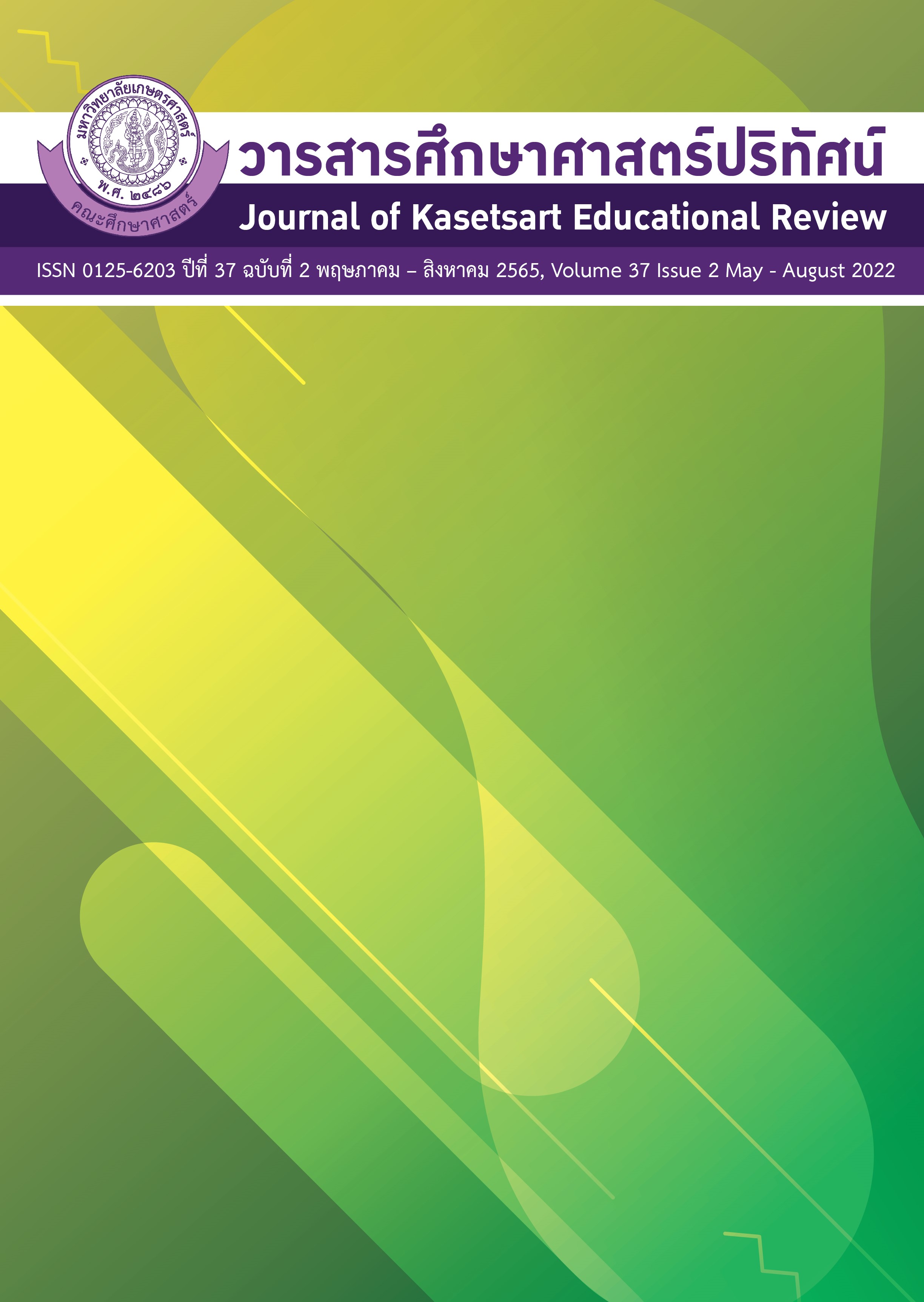ผลของการจัดการเรียนรู้แบบสืบเสาะบนฐานการโต้แย้ง ที่มีต่อความสามารถในการให้เหตุผลเชิงวิทยาศาสตร์และความเข้าใจมโนทัศน์ เรื่อง แรงและการเคลื่อนที่ ของนักเรียนชั้นมัธยมศึกษาปีที่ 4
คำสำคัญ:
การจัดการเรียนรู้แบบสืบเสาะบนฐานการโต้แย้ง, ความสามารถในการให้เหตุผลเชิงวิทยาศาสตร์ มโนทัศน์, แรงและการเคลื่อนที่บทคัดย่อ
การวิจัยครั้งนี้มีวัตถุประสงค์เพื่อ 1) เปรียบเทียบความสามารถในการให้เหตุผลเชิงวิทยาศาสตร์ก่อนเรียนและหลังเรียนด้วยการจัดการเรียนรู้แบบสืบเสาะบนฐานการโต้แย้งของนักเรียนระดับชั้นมัธยมศึกษาปีที่ 4
2) เปรียบเทียบความเข้าใจมโนทัศน์ เรื่อง แรงและการเคลื่อนที่ ก่อนเรียนและหลังเรียนด้วยการจัดการเรียนรู้แบบสืบเสาะบนฐานการโต้แย้งของระดับนักเรียนชั้นมัธยมศึกษาปีที่ 4
กลุ่มที่ศึกษา คือ นักเรียนระดับชั้นมัธยมศึกษาปีที่ 4 แผนการเรียนวิทยาศาสตร์-คณิตศาสตร์ ภาคเรียนที่ 1 ปีการศึกษา 2563 ที่กำลังเรียนรายวิชาฟิสิกส์ โรงเรียนแห่งหนึ่งในจังหวัดสมุทรปราการ ซึ่งได้มาจากการสุ่มแบบกลุ่ม จำนวนกลุ่มละ 50 คน
เครื่องมือที่ใช้ในการวิจัย คือ แผนการจัด
การเรียนรู้แบบสืบเสาะบนฐานการโต้แย้ง เป็นแผนจัด
การเรียนรู้ที่มุ่งเน้นการสร้างนวัตกรรมให้นักเรียนสามารถ
สืบเสาะหาความรู้ที่ สนับสนุนการสร้างองค์ความรู้
การสร้างโดยใช้แบบวัดความสามารถในการให้เหตุผล
เชิงวิทยาศาสตร์ และแบบวัดความเข้าใจมโนทัศน์ เรื่อง แรงและการเคลื่อนที่ สถิติที่ใช้ในการวิจัยได้แก่ ค่าเฉลี่ย
ส่วนเบี่ยงเบนมาตรฐาน และ การทดสอบค่าที
ผลการวิจัยปรากฎว่า 1) ผลการจัดการเรียนรู้แบบสืบเสาะบนฐานการโต้แย้งของนักเรียนระดับชั้นมัธยมศึกษาปีที่ 4 หลังจากการจัดการเรียนแบบสืบเสาะบนฐานการโต้แย้ง ส่งผลให้นักเรียนมีความสามารถในการให้เหตุผลเชิงวิทยาศาสตร์สูงกว่าก่อนเรียนอย่างมีนัยสำคัญทางสถิติที่ระดับ .05 2) นักเรียนที่ได้รับการจัดการเรียนรู้แบบสืบเสาะบนฐานการโต้แย้งมีความเข้าใจมโนทัศน์ เรื่อง แรงและการเคลื่อนที่สูงกว่านักเรียนที่ได้รับการจัดการเรียนแบบปกติอย่างมีนัยสำคัญทางสถิติที่ระดับ .05
เอกสารอ้างอิง
Dawson, V. M., & Venville, G. (2010). Teaching strategies for developing students’ argumentation skills about socioscientific issues in high school genetics. Research in Science Education, 40(2), 133-148.
Giere, R. (1988). Explaining science: a cognitive approach. university of Chicago Press. Chicago IL Gould P, 139-151.
Hand, B. (2009). Negotiating science: The critical role of argument in student inquiry. Science Scope, 33(2), 76.
Jimoyiannis, A., & Komis, V. (2003). Investigating Greek students' ideas about forces and motion. Research in Science Education, 33(3), 375-392.
Kelly, G. J., & Takao, A. (2002). Epistemic levels in argument: An analysis of university oceanography students' use of evidence in writing. Science Education, 86(3), 314-342.
Kuhn, D., & Udell, W. (2003). The development of argument skills. Child development, 74(5), 1245-1260.
Kuhn, D. (2010). Teaching and learning science as argument. Science Education, 94(5), 810-824.
Lederman, N. (2004). Syntax of nature of science within inquiry and science instruction. En Flick, L. y Lederman, N.(Eds.): Scientific inquiry and nature of science: implications for teaching, learning and teacher education. In: Dordrecht: Kluwer Academic.
Ministry of Education Thailand (MOE). (2017). Basic Education Core Curriculum B.E. 2551 Revised form. Bangkok: Office of the basic Education Commission. [In Thai]
Osborne, J. (2007). Science Education for the Twenty First Century. Eurasia Journal of Mathematics, Science & Technology Education, 3(3).
Punpruksa K. (2012). The development of a science teaching and learning model that emphasizes contextual teaching methods to promote analytical thinking and knowledge application. For junior high school students. Master of Education Thesis in Science Education, Srinakharinwirot University. [in Thai]
Sampson, V., & Blanchard, M. R. (2012). Science teachers and scientific argumentation: Trends in views and practice. Journal of Research in Science Teaching, 49(9), 1122-1148.
Sandoval, W. A. (2005). Understanding students' practical epistemologies and their influence on learning through inquiry. Science Education, 89(4), 634-656
Simon, S. (2011). Argumentation. In R. Edited by Toplis (Ed.), How Science Works : Exploring Effective Pedagogy and Practice. New York, USA: Routledge.
The Institute for the Promotion of Teaching Science and Technology(IPST),Ministry of Education.(2017). Analyzing Science Indicators in The ScienceLearning Curriculum Manual (Revised 2017 according to the Axis curriculum,2008, elementary level), Ministry of Education. [In Thai]
Tweerat, P. (2000). Research methods in behavioral and social science. 8(1), Bangkok: Organization of Educational and Psychological Testing. Srinakharinwirot University [In Thai]
Wellington, J., & & Ireson, G. (2012). Science Learning, Science Teaching. New York, USA: Routledge.
Zohar, A., & Nemet, F. (2002). Fostering students' knowledge and argumentation skills through dilemmas in human genetics. Journal of Research in Science Teaching: The Official Journal of the National Association for Research in Science Teaching, 39(1), 35-62.
ดาวน์โหลด
เผยแพร่แล้ว
ฉบับ
ประเภทบทความ
สัญญาอนุญาต
ลิขสิทธิ์ (c) 2022 วารสารศึกษาศาสตร์ปริทัศน์

อนุญาตภายใต้เงื่อนไข Creative Commons Attribution-NonCommercial-NoDerivatives 4.0 International License.
บทความทุกบทความเป็นลิขสิทธิ์ของวารสารคณะศึกษาศาสตร์ มหาวิทยาลัยเกษตรศาสตร์ วิทยาเขตบางเขน
วารสารศึกษาศาสตร์ปริทัศน์ (Kasetsart Educational Review)






